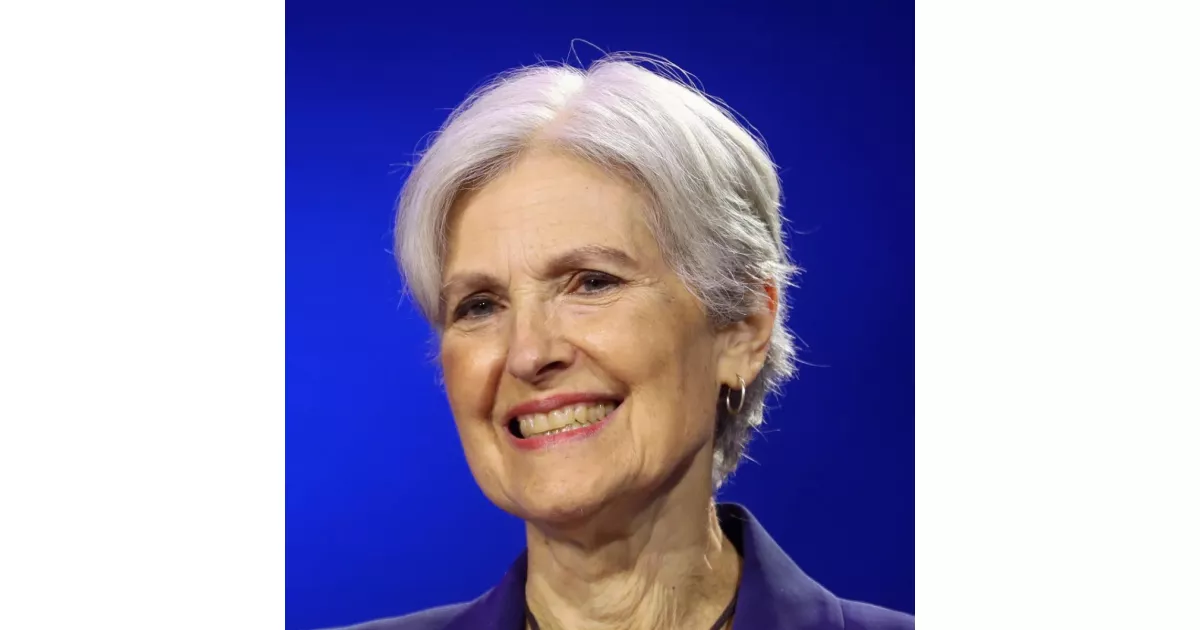Jill Stein is an American physician, activist, and politician known for her involvement with the Green Party. She was the Green Party's presidential nominee in 2012 and 2016 and ran for Governor of Massachusetts in 2002 and 2010 as the Green-Rainbow Party candidate. Stein remains active in politics and is currently running for president in the 2024 United States presidential election.
1980: Beginning of Tenfold Increase in Chlorpyrifos Detections
In 1980, the detection of chlorpyrifos, an organophosphate insecticide, in urine began a tenfold increase, reaching its peak in 1990. This trend, cited by Stein in 2000, indicated the growing exposure to organophosphates over time.
1990: Chlorpyrifos Detections Peak After Tenfold Increase
In 1990, the detection of chlorpyrifos in urine reached its peak after a tenfold increase that began in 1980. This data point, referenced by Stein in 2000, showcased the escalating exposure to organophosphates during that period.
2000: Stein Raises Concerns about Pesticide Exposure in Children
In 2000, Jill Stein and her co-authors published a work highlighting the concern of pesticide exposure in children, stating that millions of American children consume an average of eight pesticides daily through their food. They emphasized the neurotoxic nature of organophosphate insecticides and their prevalence in homes and schools.
2001: Stein Advocates for Restrictive Use of Military Force
According to Jill Stein, the United States should only resort to military force when there is compelling evidence of an impending threat of an actual attack. She stated that the experiences since 2001, which she deemed an 'utter disaster,' did not demonstrate the benefits of U.S. military involvement.
2003: Stein Criticizes U.S. Military Interventions
Jill Stein criticized the 2003 invasion of Iraq, the U.S.-led war in Afghanistan, and U.S. participation in the Saudi Arabian-led intervention in Yemen. She stated, 'We are party to the war crimes that are being committed by Saudi Arabia, who’s using cluster bombs made by us. And we’ve supplied $100 billion worth of weapons to the Saudis in the last decade...It’s against our own laws. The Leahy bill requires that we not sell weapons to human rights abusers.'
2008: Stein Publishes on Pesticides and Aging
In 2008, Jill Stein wrote about the potential health risks of pesticides, particularly their link to cognitive decline and neurodegenerative diseases, in her book *Environmental Threats to Healthy Aging*.
July 1, 2012: Jill Stein Qualifies for Federal Matching Funds
On July 1, 2012, the Stein campaign reported it had received enough contributions to qualify for primary season federal matching funds, making Stein the first Green Party presidential candidate ever to have qualified for federal matching funds.
2012: Stein Calls for Nationalizing and Democratizing the Federal Reserve
During her 2012 presidential campaign, Jill Stein advocated for 'nationalizing' and 'democratizing' the Federal Reserve. She proposed placing it under the authority of a Federal Monetary Authority within the Treasury Department, thereby ending its independence.
2012: Stein Proposes Decreased Spending on Space Exploration
In 2012, Jill Stein advocated for a slight decrease in spending on space exploration while supporting the maintenance of existing funding levels for scientific and medical research, reflecting her priorities in government spending.
2012: Stein Highlights Economic Benefits of Renewable Energy over Nuclear
In 2012, Jill Stein emphasized that investing in conservation and renewable energy sources creates three times more jobs per dollar compared to nuclear power. She also pointed out that nuclear energy is currently the most expensive form of energy production per unit.
2012: Stein Favors Maintaining International Aid Spending
In 2012, Jill Stein expressed her support for maintaining existing levels of spending on international aid.
2012: Stein Opposes Raising the Debt Ceiling
In 2012, Jill Stein opposed increasing the debt ceiling, advocating instead for raising taxes on the wealthy and implementing cuts to military spending as a means to address the national debt.
2012: Stein Proposes Funding for 'Green New Deal'
In 2012, Jill Stein proposed funding her 'Green New Deal' plan with a 30% reduction in the U.S. military budget, the return of U.S. troops, and increased taxes on stock-market speculation, offshore tax havens, and multimillion-dollar real estate. She cited a 2012 study that suggested the economic benefits of this plan would offset its start-up costs.
2012: Stein Advocates for the Green New Deal
In her 2012 presidential campaign, Stein advocated for the Green New Deal, proposing the creation of renewable energy jobs to address climate change and environmental issues, with the goal of employing "every American willing and able to work."
February 6, 2015: Jill Stein Forms Exploratory Committee for 2016 Presidential Run
On February 6, 2015, Stein announced the formation of an exploratory committee in preparation for a potential campaign for the Green Party's presidential nomination in 2016.
December 2015: Stein Attends RT Anniversary Banquet in Moscow
In December 2015, Jill Stein attended a banquet in Moscow commemorating the 10th anniversary of the Russian state-run television network RT, an event also attended by President Vladimir Putin. While in Russia, Stein critiqued U.S. foreign policy, arguing that the U.S. pursued a 'policy of domination' rather than prioritizing 'international law, human rights, and diplomacy.' She also expressed concerns about human rights within the U.S.
2015: Stein Attends RT Gala in Moscow
In 2015, Stein attended the RT 10th anniversary gala in Moscow, where she was photographed dining at the same table as Russian President Vladimir Putin. This incident sparked controversy, although Stein maintained that she had no contact with Putin during the dinner, dismissing it as a "non-event."
2015: Stein Critiques Official Employment Numbers
In 2015, Stein criticized official employment numbers, asserting that they were "designed to essentially cover up unemployment" and that the actual unemployment rate was significantly higher, around 12-13%.
2015: Jill Stein Files 2015 Tax Return
Stein filed her 2015 tax return, portions of which she would later release during her 2016 presidential campaign.
February 2016: Stein Challenges Official Unemployment Figures
In February 2016, Stein argued that the official unemployment rate was misleading, claiming that "real unemployment is nearly 10%, 2x as high as the official rate."
March 2016: Stein Voices Opposition to Nuclear Energy
Jill Stein has consistently spoken out against nuclear energy, asserting that it is 'dirty, dangerous, and expensive,' and should be ruled out based on these factors. In March 2016, she took to Twitter to express her views, stating, 'Nuclear power plants = weapons of mass destruction waiting to be detonated.'
March 2016: Jill Stein Files Financial Disclosure
On March 2016, Stein's financial disclosure indicated that she maintained investments of as much as $8.5 million, including mutual or index funds that included holdings in industries that she had previously criticized.
June 2016: Jill Stein Reaches Highest Polling Average
In late June 2016, Stein's highest polling average in four candidate polls was 4.8% nationally.
June 2016: Stein Supports Brexit
Jill Stein expressed her support for the UK's decision to leave the European Union (Brexit) in June 2016.
July 2016: Stein Criticized for Statements on GMOs
In July 2016, commentators criticized Jill Stein's statements about genetically modified organisms (GMOs), arguing that her views contradicted the scientific consensus on their safety. Critics, including Slate's business and economics editor Jordan Weissmann, pointed out that Stein's demands for proof of safety ignored the extensive scientific studies showing no evidence of harm from existing GM foods.
August 1, 2016: Jill Stein Selects Ajamu Baraka as Running Mate
On August 1, 2016, after former Ohio state senator Nina Turner reportedly declined to be her running mate, Stein chose human rights activist Ajamu Baraka as her vice-presidential running mate.
August 2016: Jill Stein Releases Tax Return
In August 2016, Stein released the first two pages of her 2015 tax return on her website.
September 7, 2016: Jill Stein Charged for Dakota Access Pipeline Protest
On September 7, 2016, a North Dakota judge issued a warrant for Stein's arrest for spray-painting a bulldozer during a protest of the Dakota Access Pipeline. Stein was charged in Morton County with misdemeanor counts of criminal trespass and criminal mischief.
September 2016: Stein Joins Dakota Access Pipeline Protests
In September 2016, Jill Stein actively participated in protests against the Dakota Access Pipeline in North Dakota, demonstrating her solidarity with the Great Sioux Nation's opposition to the project. Both Stein and her running mate, Ajamu Baraka, faced misdemeanor charges for spray-painting messages on bulldozers at the pipeline construction site, further highlighting their stance on environmental issues and indigenous rights.
September 2016: Stein Supports Lowering the Voting Age to 16
In September 2016, Jill Stein announced her support for lowering the voting age to 16, aligning her stance with many other Green parties globally.
September 2016: Stein Considers Quantitative Easing for Universal Basic Income and Medicare for All
In September 2016, Jill Stein stated that she would consider employing quantitative easing as a means to establish a universal basic income or a Medicare for all program.
September 2016: Stein States Need for More Information on Israeli-Palestinian Conflict
When asked in September 2016 about her stance on a two-state versus a one-state solution for the Israeli-Palestinian conflict, Jill Stein responded by saying, 'I feel like I am not as informed as I need to be to really weigh in on that.'
October 21, 2016: Stein Questioned on Evidence of Corporate Influence on Vaccines
On October 21, 2016, Jill Stein was asked to provide evidence of corporate influence on vaccine regulations that endanger children's health. In response, she cited cases involving Vioxx and Monsanto as evidence, sparking further debate on her stance and the validity of her claims.
November 2016: Jill Stein Agrees to Spearhead Recount Effort
In November 2016, after concerns were raised about the integrity of the presidential election results, Stein agreed to spearhead the recount effort in Michigan, Wisconsin, and Pennsylvania.
November 24, 2016: Crowdfunding Campaign Launched for Recount Effort
On November 24, 2016, a crowdfunding campaign launched to support the costs of the recount, raised more than $2.5 million in under 24 hours, and $6.7 million in nearly a week.
November 25, 2016: Jill Stein Files for Recount in Wisconsin
On November 25, 2016, with 90 minutes remaining on the deadline to petition for a recount to Wisconsin's electoral body, Stein filed for a recount of its presidential election results.
December 2, 2016: Lawsuit Filed to Stop Recount in Michigan
On December 2, 2016, Michigan Attorney General Bill Schuette filed a lawsuit to stop Stein's recount.
December 3, 2016: Jill Stein Drops Pennsylvania Recount Case
On December 3, 2016, Stein dropped the state recount case in Pennsylvania, citing "the barriers to verifying the vote in Pennsylvania are so pervasive and that the state court system is so ill-equipped to address this problem that we must seek federal court intervention."
December 5, 2016: Michigan Recount Ordered and Then Halted
On December 5, 2016, a U.S. District Judge ordered Michigan election officials to hand-recount 4.8 million ballots. However, the Michigan Court of Appeals ruled that Stein was not an "aggrieved candidate" and ordered the Michigan election board to reject her petition for a recount.
December 7, 2016: Michigan Recount Halted
On December 7, 2016, Judge Goldsmith halted the Michigan recount that he had previously ordered on December 5, 2016.
December 9, 2016: Hearing Scheduled for Wisconsin Recount
On December 2, 2016, a U.S. District Judge denied an emergency halt to the recount in Wisconsin, allowing it to continue until a December 9, 2016, hearing.
December 12, 2016: Pennsylvania Recount Request Rejected
On December 12, 2016, a U.S. District Judge rejected Stein's request for a recount in Pennsylvania.
2016: Stein Calls for the Release of Whistleblowers and Political Prisoners
During her 2016 Green Party nomination acceptance speech, Jill Stein advocated for an end to the persecution of whistleblowers and the release of individuals she considered political prisoners, including Chelsea Manning, Julian Assange, and Edward Snowden. She went so far as to state her intention to include Snowden in her cabinet if elected, demonstrating her strong stance on government transparency and freedom of information.
2016: Stein Supports New Financial Transaction Tax and Estate Tax Increase
In 2016, Jill Stein expressed her support for a new 0.5% financial transactions tax applied to the sale of stocks, bonds, and derivatives. She also advocated for an increase in the estate tax to a minimum of 55% for inheritances exceeding $3 million.
2016: Stein Supports Increased NASA Funding
In 2016, Jill Stein expressed her support for increased funding for NASA, proposing that redirecting funds from the military budget could enable greater investment in space exploration instead of military activities.
2016: Stein Calls for Reparations for Slavery and Addresses Structural Racism
In 2016, Jill Stein publicly denounced the structural racism inherent in the U.S. judicial and prison system. On Juneteenth of that year, she advocated for reparations for slavery as a means of addressing historical injustices.
2016: Stein Reiterates 'Green New Deal' Funding Proposal
In 2016, Jill Stein reiterated her proposal to fund the 'Green New Deal' through a 30% reduction in the U.S. military budget, the return of U.S. troops, and increased taxes on stock-market speculation, offshore tax havens, and multimillion-dollar real estate.
2016: Stein Supports Publicly Owned Banks and Government as Employer of Last Resort
In 2016, Jill Stein voiced her support for the creation of nonprofit, publicly owned banks, committing to establish such entities at both the federal and state levels. During an interview that year, she expressed her belief in the concept of 'the government as the employer of last resort.' Although she acknowledged that the specifics of this idea were still under development, she indicated that a position paper on the topic was forthcoming. Stein's 2016 platform included a pledge to guarantee housing but did not provide detailed plans for its implementation.
2016: Favorable Coverage on Russian State-Owned Media
In 2016, NBC News reported that there had been over 100 favorable stories about Stein on Russian state-owned media networks RT and Sputnik in 2015 and 2016. This coverage, along with Stein's presence at the RT gala in Moscow in 2015, contributed to ongoing scrutiny of her potential ties to Russia.
2016: Stein Reiterates Call for Federal Reserve Reform
In 2016, during her second presidential run, Jill Stein reiterated her call to 'nationalize' and 'democratize' the Federal Reserve, aiming to bring it under the control of a Federal Monetary Authority within the Treasury Department and eliminate its independent status.
2016: Stein Promotes Green New Deal to Address Unemployment and Poverty
In her 2016 presidential campaign, Stein continued to promote the Green New Deal, arguing that it could effectively address unemployment and poverty by creating renewable energy jobs and tackling climate change and environmental concerns. Stein envisioned the plan as employing "every American willing and able to work."
August 2017: Jill Stein Pleads Guilty to Misdemeanor Criminal Mischief
In August 2017, Stein pleaded guilty to misdemeanor criminal mischief for her role in the Dakota Access Pipeline protest and was placed on probation for six months.
December 18, 2017: Senate Intelligence Committee Investigates Stein Campaign
On December 18, 2017, The Washington Post reported that the Senate Intelligence Committee was investigating Stein's 2016 presidential campaign for potential "collusion with the Russians." The Stein campaign stated its willingness to cooperate with investigators.
2017: Stein Criticizes Senate Report
In 2017, Stein criticized a Senate report authored by New Knowledge, a firm involved in the investigation into Russian interference in the 2016 election. Stein called the report "dangerous new McCarthyism" and accused the firm of being "sponsored by partisan Democratic funders" and involved in "election interference" in the 2017 US Senate election in Alabama.
May 2018: Unspent Recount Funds Reported
In May 2018, reports emerged that approximately $1 million of the $7.3 million raised for election recounts remained unspent, raising questions about the funds' usage.
July 2018: Stein Expresses Concerns Over Corporate Influence on Vaccine Approvals
In July 2018, Jill Stein argued that vaccines should be approved by a trustworthy board, expressing distrust in the Food and Drug Administration (FDA) and the Centers for Disease Control and Prevention (CDC) due to perceived corporate and pharmaceutical influence. She drew parallels to alleged Monsanto lobbyists' influence in food safety approvals, a claim that sparked controversy and debate.
July 31, 2018: Legal Expenses Related to Senate Probe Reported
By July 31, 2018, Stein had spent nearly $100,000 of the recount money on legal representation related to the Senate investigation into election interference.
December 2018: Senate Reports on Russian Interference
In December 2018, two reports commissioned by the US Senate found that the Internet Research Agency had boosted Stein's candidacy through social media posts, particularly targeting African-American voters. Although there was no evidence suggesting Stein's knowledge of the operation, her support for policies aligning with Russian foreign policy goals drew criticism.
March 2019: Stein Cooperates with Senate Inquiry
In March 2019, Stein's spokesman confirmed that she had "fully cooperated with the Senate inquiry" into election interference.
October 2019: Clinton Accuses Stein of Being a "Russian Asset"
In October 2019, Hillary Clinton alleged that Russia was plotting to support a third-party candidate in the 2020 election, suggesting that this candidate could be either Jill Stein, whom she labeled a "Russian asset," or Tulsi Gabbard. Clinton's comments were later clarified to indicate that she believed Republicans were behind the plot. Stein denounced Clinton's remarks as "slanderous."
2020: Clinton Suggests Russian Interference in 2020 Election
In October 2019, Hillary Clinton suggested that Russia was planning to interfere in the 2020 US election by supporting a third-party candidate, initially naming Jill Stein and Tulsi Gabbard as potential targets. Although Clinton later clarified that she believed Republicans were orchestrating this plot, her initial remarks sparked controversy and drew strong condemnation from Stein.
November 9, 2023: Stein Announces Third Presidential Bid
On November 9, 2023, Stein announced her third bid for president, outlining her main priorities as anti-war efforts, supporting the Green New Deal, advocating for universal healthcare, and addressing what she described as "genocide in Gaza." The Democratic Party expressed concerns that Stein's candidacy could potentially draw support away from Joe Biden among left-wing voters in the general election.
November 2023: Stein Denounces Israel's Invasion of Gaza and U.S. Military Funding
In November 2023, Jill Stein released a statement condemning Israel's invasion of the Gaza Strip and criticizing U.S. military funding of Israel. She accused Israel of war crimes and the Biden administration of facilitating them, calling for a ceasefire, an end to the Israeli blockade, and an end to the "occupation" and "apartheid".
2024: Stein Supports and Then Withdraws Support for Cornel West's Presidential Campaign
In 2024, Stein initially supported activist and scholar Cornel West's presidential campaign under the Green Party and became his campaign manager. However, after West withdrew his bid for the Green Party presidential nomination to run as an independent, Stein retracted her endorsement and suggested that the Green Party would seek a different nominee. She also hinted at a possible presidential bid of her own.
2030: Stein Argues for Healthcare Savings from Renewable Energy Transition
Jill Stein has argued that the costs associated with transitioning to 100% renewable energy by 2030 would be partially offset by savings in healthcare expenditures. She cites studies that project a reduction of 200,000 premature deaths and a decrease in illnesses due to cleaner energy sources. She has also noted that when Cuba lost Soviet oil subsidies, it experienced significant drops in diabetes (down 50%), cardiovascular disease (down 30%), and all-cause mortality (down 18%).
2030: Stein Proposes 100% Renewable Energy by 2030
Jill Stein proposes a transition for the United States to achieve 100% renewable energy by the year 2030.
Mentioned in this timeline

Vladimir Vladimirovich Putin is a Russian politician and former intelligence...
Ukraine is a country in Eastern Europe the second-largest on...

Hillary Diane Rodham Clinton is a prominent American politician lawyer...

Joe Biden is an American politician who served as the...

Tulsi Gabbard is an American politician and military officer currently...
NBC News is the news division of NBC operating under...
Trending

3 minutes ago Medvedev to clash with Auger-Aliassime in Dubai semifinals at Duty Free Tennis.

4 minutes ago Friday's Weather: Snow Returns After Brief Mildness, Lighter Winds Expected, End of Workweek.

4 minutes ago Lindsay Lohan reflects on troubled teen years and rebuilding her life in Dubai.
1 hour ago Ameren Prices $400M Senior Notes, $900M Bonds for Grid Investment, Reshaping Debt
2 hours ago Pokemon Celebrates 30 Years: A Cultural Phenomenon with Multimillion-Dollar Cards

2 hours ago Daylight Saving Time 2026: Prepare to set your clocks forward and lose sleep.
Popular

Jesse Jackson is an American civil rights activist politician and...

Barack Obama the th U S President - was the...

Susan Rice is an American diplomat and public official prominent...

XXXTentacion born Jahseh Dwayne Ricardo Onfroy was a controversial yet...

Michael Joseph Jackson the King of Pop was a highly...

Kashyap Pramod Patel is an American lawyer who became the...
